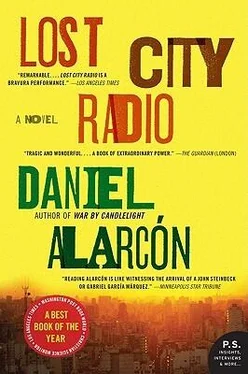Norma sighed. “That sounds dangerous,” she said.
Victor heard her alter her voice, draining it of its sweetness. The driver didn’t know. He couldn’t know.
It was dark when they arrived at home. Norma’s apartment had a wide window that looked out onto a quiet street. She had said it was small, but to Victor it seemed palatial. “You’ll sleep here,” she said, and pointed to the couch. A neon sign cast a harsh blue light over the room. Norma explained that it was a pharmacy, that you could buy medicine there. She turned on a lamp, and the shadows dispersed. He could see she was tired. He expected to be reprimanded, but instead she slipped away into the kitchen and set some water to boil. Victor sat on the sofa, staring at his hands. He was afraid to look at the strange apartment.
Norma emerged with tea and a basket of bread. “Are you feeling better?”
He hadn’t eaten all day, and the emptiness in his stomach stirred. She must have seen the hunger in his eyes. “Eat,” Norma said. “A boy needs to eat.”
The bread she served was strange: square, with a neat brown trim, its center a white the color of milk. Victor bit into a slice, and it dissolved in his mouth, coming apart like string. Still, he ate greedily, and it felt good. He strained to swallow mouthfuls of the stuff, but it expanded like bubble gum, rolling over his teeth and against his cheeks. He looked up. Norma, he realized, was smiling. He stopped chewing.
“It’s okay,” she said. “I was just watching.”
Victor nodded. She wasn’t old. She wasn’t like the abandoned elderly that crept through town with their bent wooden canes, but she was older than his mother, and didn’t have the copper glow his people had. She was pale, and her black hair fell straight in a ponytail down to the middle of her back. She gave the impression of not caring so much what she looked like. In 1797, Norma would have a hard time finding a husband. Victor ate and watched her. Her angular face contained a geometry he didn’t recognize, like the bread she offered him, built of right angles. Maybe the softness of her voice clashed with her sharp features. He’d never seen anyone like her up close, not that he could remember. No one this color. After having listened to her for so many years, strangely, it had never occurred to him to put a face with that voice. He had never wondered what she looked like, not once. Did anybody? That lack of imagination struck Victor as strange: had he thought of her as some kind of spirit? As a voice without a body or a face or even a soul? More ghosts. He’d never thought of her as real.
“You must be tired,” Norma said after a while.
Victor nodded.
“I’ve never been to the jungle,” she said.
He chewed and nodded. “It’s different,” he offered.
“I imagine it is,” Norma said. Could she see how tired he was? Did she know what he wanted to tell her? They were silent for a moment.
“You don’t want to talk, do you?” Norma asked.
“No,” Victor said, surprising himself. There was too much to tell.
IF NORMA were honest, she might remember Rey’s disappearance as what it was: a series of tiny flashes of light, a rising sense of danger, and then, in place of some plosive event, only this: a surreal, mystifying stillness. He leaves for a trip into the jungle — a trip like dozens he’s taken before. Then there is the cold, hard fact of his silence. No news, no word, and Norma’s life changing with each passing day, flattened beneath a crushing weight, bled of its color.
It had been ten years now.
The early days were torturous: a pain emanating outwards from each cell in her body, and the fact of his absence everywhere. She stopped strangers in the street, inspected the faces of people on buses and trains, their wrinkles, their smiles, the shapes of their tired eyes, even the shoes they wore. Each day her husband did not return, she felt herself losing her balance, the work of carrying on too much and too cruel. The ways she missed him were endless: his smell still pervaded their apartment, that mixture of sweat and cheap soap. She missed his dimpled cheeks, his kiss, and the affected way he read the newspaper, as if his sharp gaze could bore a hole in the text. He folded it into lengthwise thirds and was embarrassed to admit he indulged only in the sports section. She missed this, too: his body, his touch. His hands running up and down her back. Her own fingernails finding his spine, clawing, as if she could tear into him. She missed the face he made, always the same anguished expression, eyes flittering closed, deep concentration, and when he was behind her, she loved it, but she missed seeing him, seeing the blood rush to his face, the clouding of his features, the release. At night, she stayed awake and thought of him, too afraid to touch herself. Dread was everywhere. What if he never came back?
For ten years, he had existed in memory, in that netherworld between death and life — despicably, sadistically called missing— and she had lived with the specter of him, had carried on as normal, as if he were away on an extended vacation and not disappeared and likely dead. In the beginning, she had played detective, and in a sense, everything had been easier since she stopped. Not given up; simply stopped. In the first year of his absence, she had visited each of his colleagues at the university to ask for information. Where had he gone? It was a bent older gentleman who told her: he wasn’t sure, but he’d heard the number 1797. What was he researching? Medicinal plants, said another, but this much she knew. Had they heard anything? And here they all shook their heads and looked away.
One professor told her Rey’d had a taste for psychoactives, jungle juju, he said, but this wasn’t news, was it? Norma shook her head: of course not, of course not. It was a bright autumn day, and the war had been over for two months. The list of collaborators had been read on the radio a week before. The professor scratched his beard and looked distractedly out the window at a swatch of blue sky. His office and his person were in disarray. “Maybe he just lost it.”
“I don’t understand.”
“It’s just a thought. Took too much of something. Went native.” He smoothed the wrinkles of his suit. “Maybe he’ll snap out of it. Maybe he’ll wander back.”
Norma shook her head. It made no sense. “What about the list they read? What about the IL? Was Rey IL?”
Why did she ask? Did she even want to know? It was the same every time: a blank look, a stammered response, and then a pause as her husband’s colleagues took the measure of her. Doors were closed discreetly, blinds drawn, telephones unplugged — all this at the mere mention of the IL. But the war was over, wasn’t it?
This professor turned to face her. They had known each other socially — Christmas parties and birthdays, nothing more.
“Were you followed?” he asked.
It hadn’t occurred to her. “Who would follow me?”
The professor sighed. “It doesn’t matter,” he said. “I knew your husband well. We were at the Moon together. He wasn’t IL. He couldn’t have been.”
“What do you mean?”
“Everyone knows there was no such thing.”
Norma was silent. She hardly breathed.
“It was a government invention, a fraud. Something the Americans cooked up to scare us.”
“Oh,” she managed.
“You’d do well to be careful when asking questions such as these.” He paused and took a deep breath. “Someone might misinterpret.”
Norma thanked him for his time, gathered her things and left quickly.
She scoured the papers for any news, but there was so much to tell about the end of the war. Who had time for a missing professor? There were battles to write about and lists of casualties to collect. The country seemed to be collapsing on itself: a shootout between decommissioned soldiers erupted in an underground bar in The Thousands. A man in Asylum Downs was run out of the neighborhood, his house set ablaze after his name had been listed among the collaborators. It was the war in its death throes, every day something new, the violence sputtering to its anarchic conclusion.
Читать дальше












